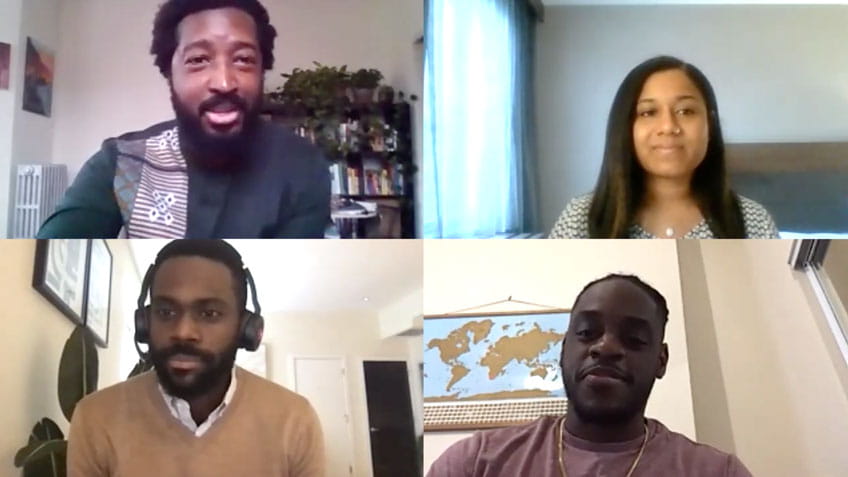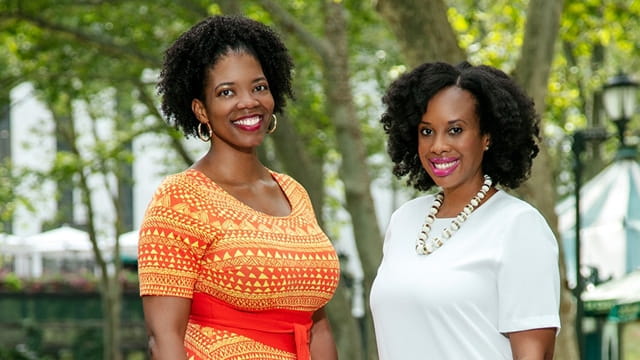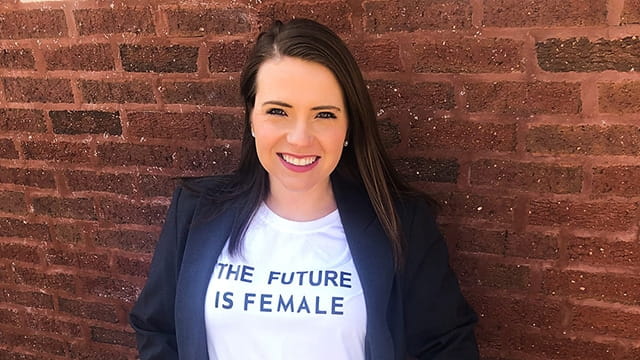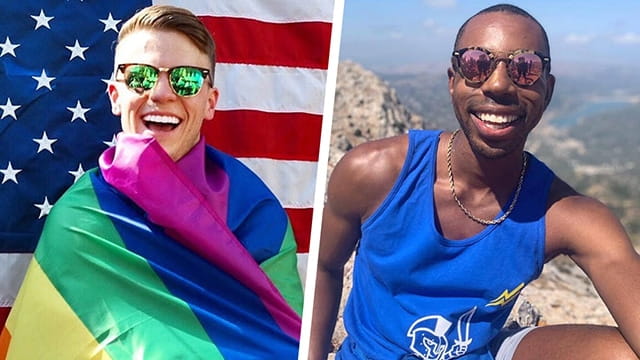“After 2020, You Should Not Be the Same Person”
A POV on progress from the officers of the E&W MBA Program's Black Management Association
Michael Ladipo ’21 was surprised by the public reaction to the killing of George Floyd. It left him feeling cautiously optimistic, even as he mourned.
Broadcasted deaths of Black Americans tend to draw a muted reaction, Ladipo says, but he felt something different in the response to Floyd’s death. Never had Ladipo heard from so many colleagues who asked if he was okay, or from organizations and people who suddenly wanted to be involved in the fight for racial justice. Ladipo, who works at Discover Financial Services and serves as president of the Kellogg Evening & Weekend MBA Program's Black Management Association, says that the myriad responses to the protests were overwhelming, especially while still navigating the new norms of life at work, school and home amid the COVID-19 pandemic. But he also saw the shift in public attitude as a unique opportunity to make positive change.
“It’s been a sloppy, messy period of trying to balance my own personal wellbeing with trying to make the world a better place,” Ladipo says.
And in 2020, that’s the mood of the BMA’s board — overwhelmed, heartbroken, and filled with hope. Kellogg spoke with the BMA’s four board members about the calls for racial justice, how Kellogg and the corporate world are responding, and what they want to see change at Kellogg and across the business world.
Looking back
The corporate and academic worlds responded en masse to Floyd’s death, with many calling for systemic changes and racial justice. But Cameron Merritt ’22's biggest fear is that most companies are simply doing the bare minimum — giving platitudes without acting. He believes that organizations everywhere must fight to do more than simply get good PR from calls for racial justice.
"There must be serious evaluation of every part of a business to see where resources can be leveraged in the fight for racial equity, justice and inclusion,” says Merritt, senior VP of the BMA and a business development specialist at Ford Motor Company.
At Kellogg, the BMA and administration are now working together. Senior leadership holds regular meetings and conversations with students, Merritt said, including ongoing conversations with the BMA. The jury is still out on whether Kellogg’s intentions and actions will lead to real change, he says, but he has hope.
“From the administration standpoint, I think we're moving in the right direction,” Merritt says. “We continue those conversations, but we're still at a level where we're still trying to piece together what we want the future to look like. And I think there's a lot of opportunity in how we can change.”
Kicking off the Black Leadership Speaker Series
Nesa Mangal ’22, an external communications professional at a Big Four firm and VP of communications for the BMA, is dedicating her career to amplifying unheard voices and fostering connectivity. In 2020, her commitment came to life at Kellogg as she worked with the BMA on launching the Black Leadership Speakers Series. All four board members agree that it’s the group's biggest accomplishment of the year.
“It's a significant win for the Kellogg community today and the Kellogg community of tomorrow,” she said. “Moving the needle on this has been something that I know we're all really proud of.”
Mangal strategized the objective of the Black Leadership Series, which is to “create a safe space for Black students to learn, listen, ask questions and engage in dialogue on how to navigate their professional careers.” The objective also states that the series serves as an opportunity for non-Black students to learn about the challenges Black professionals face, and how they can take actions to address the systemic racism in the workplace and in their everyday lives.
The Black Leadership Series has been a collaborative effort, the board members say. Mangal credits Ladipo with driving the necessary conversations to implement the series. Ladipo, in turn, gives a nod to Bernard Banks '08, Kellogg’s associate dean for leadership development and inclusion, for his collaboration to make the series a reality.
The series kicked off in October with Shundrawn Thomas, the president and CEO of Northern Trust Asset Management, who discussed the importance of deliberately developing a growth mindset. Throughout the year, other speakers will discuss their experiences, building skill sets and ways that Black students can navigate becoming leaders. Ladipo says that the program will help all students understand the often confusing dynamics of corporate leadership, while helping to bridge the inequality gap that exists in corporate sponsorship and mentorship.
Merritt says that the Black Leadership Speakers Series is a great example of acting beyond the bare minimum. He hopes the series will create real change and envisions coming back to Kellogg in a decade and seeing the series living on through a more diverse student body.

Clockwise from top left: Michael Ladipo '21, Nesa Mangal ’22, Donovan Dean '22, Cameron Merritt '22
Goals for the future
When Donovan Dean ’22 started researching an advanced degree, he wasn’t sure about business school. What could it offer him? As he researched, he believed that Kellogg was a place where he could grow and explore new options. Now, he regularly meets people who have a job he didn’t even know could exist. Business school has been a mind- and world-expanding experience for Dean, one he knows could be pivotal for other people of color.
But Dean, the BMA’s VP of marketing and a project manager at Clune Construction Company, also wishes he saw many more students who look like him at Kellogg. All four members of BMA’s board say that they want a more diverse student body in the coming years.
Making Kellogg’s student body more diverse will take a conscious effort, Dean says. The admissions office likely needs to be more diverse, the board members say, as does how they recruit new students.
Change comes from action, Dean said, which often means trial and error. Dean said that Kellogg will need to reach out to potential students in new places, partner with new organizations, and try things that it has never tried before. He doesn’t have all the answers, he acknowledges, but believes that Kellogg may see a lot of growth by simply educating potential students on why an MBA at Kellogg would be the right choice for them. That’s something he found out for himself. “A lot of like Black people don't even fully understand what business school really is,” Dean says. “I didn't until I started looking into it.”
Now, Dean sees the value of business school each day. As he explores the possibilities, his world expands further. He believes that other students of color should have the same opportunity but says that giving them that opportunity will take effort by Kellogg’s admissions office.
The BMA’s other desired major goal for the coming years, all four board members say, is to implement a core class on diversity and inclusion.
“I'd like to see it as in the form of a mandatory class,” Ladipo says. “In the U.S., we're becoming a lot more interconnected. Why shouldn't we have a core class on diversity and inclusion, on how to lead diverse organizations or lead with diverse leaders? We would love to see that over the next year.” Advocating for a core diversity and inclusion course is the perfect opportunity to engage current students and alumni who see the value in this change. It will take a community effort and the board is looking forward to bringing everyone on this journey.
And for the BMA, Merritt says that the main goal is to support and build community for other Black students at Kellogg. “We’re not a monolith and we have varied experiences,” he says. “There's diversity within the Black community and everyone's handling [this year] in their own way. And I think that it's important for us to make sure that we're there for each other.”
“You have to be comfortable with the uncomfortable, with understanding the realities of people who work with you, who work around you, acknowledge your privilege, and then use your privilege to help the under-resourced have an equal level of resources as you.”
Michael Ladipo ’21
Advice for leaders
Near the end of a sad, confusing, and hopeful year, each of the members of the BMA have advice for business leaders trying to navigate a world where many are calling for racial justice.
Feel the discomfort
Leaders should push themselves to have conversations that make them feel uncomfortable, then go beyond just having a conversation by acting on the learnings Ladipo says.
“You have to be comfortable with the uncomfortable, with understanding the realities of people who work with you, who work around you, acknowledge your privilege, and then use your privilege to help the under-resourced have an equal level of resources as you,” he says.
Listen to learn
Mangal’s advice to leaders is to understand the importance of empathy and allyship in fostering a culture of inclusion.
"A lot of people are learning to listen, but I believe we must listen to learn,” Mangal said. “[Leaders] should realize that when you engage with your people, being more empathetic starts with asking them about their experiences and taking the time to understand so that you can use the privileges you possess to remove the barriers they face.”
Dean agrees that leaders must make attempts to understand the multifaceted experiences of Black people. “I don’t think a lot of them understand these perspectives, despite that being the most important thing,” he says. “I think once they do that, everything will begin to make sense.”
Be willing to change
Merritt says that leaders must remember why these discussions on racial injustice are happening: People want change.
Racial injustice a heavy, emotional topic, he says, one which sends each person on their own path of learning. “But I think we can all agree that not engaging is not the right answer. After 2020, you should not be the same person. In many ways, you should be different."


